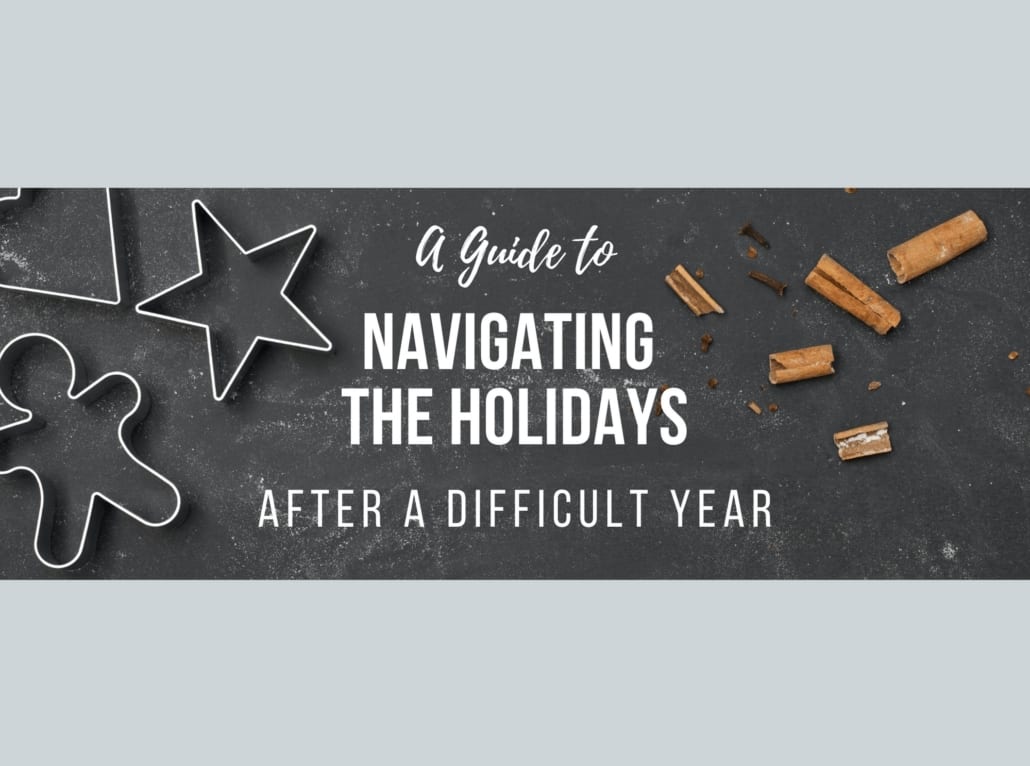The holidays often bring up emotions ranging from joy and excitement to depression and loneliness. This happens any year, but 2020 has been particularly rough for many people. Even the cheeriest of people may be finding it difficult to get in the holiday spirit. Between experiencing a global pandemic, various social justice movements, international unrest, and a presidential election; it is understandable that there may be elevated levels of anxiety, depression, and/or grief. If you find yourself having a difficult time thinking about the holidays you are not alone. My hope is that this guide on navigating the holidays can provide you with some tools to get through the holiday season this year.
Acknowledge your feelings
Allow yourself space and time to sit with the feelings that come up. This can look like giving yourself some alone time or confiding in someone close to you. You might want to talk to a friend, family member, or your therapist. It can also look like noticing the behaviors, thoughts, and physical sensations that you experience when thinking about the holidays. This could also include reflecting on everything that has happened in your life this past year.
It is okay if you are feeling more than one emotion at once. Identifying these emotions is the first step to not letting them overwhelm you. If you are experiencing sadness when thinking about the holidays and you usually feel joy, this may be uncomfortable at first. That said, acknowledging and validating the feeling can be helpful in establishing what your needs are in that moment and giving you a way to seek them out.
A good way to remember this is by thinking, “I am giving myself permission to check in and reflect”:
- Permission (to feel your feeling)
- …to check in (with your body)
- …and reflect (on what you need)
For example: “I am feeling frustrated and experiencing the need to cry. It has helped before to get a hug from my partner.”
Read more: Make Friends with your Feelings
Manage your expectations
Try setting aside some time to really think and reflect on what you want the holidays to look like for you this year. Identify what your expectations have been in the past and what they might look like now. This could help to reduce stress and anxiety around how to spend your time. Allow yourself to tune into what you actually enjoy about the holidays. This means taking a step back from what you think you are supposed to do or feel. This could range from not engaging in any of your normal activities to being creative. You can get creative about how you do engage in the activities that are special to you.
Here are some questions you can explore on your own or with your loved ones when establishing a plan for this year’s holiday season:
- Who do you want to spend the time with?
- What do you typically enjoy/not enjoy about the holiday season?
- What boundaries do you want to establish for your time and your interactions with others?
- Can you still engage in some of your usual traditions, even if you do them a little differently? Or are there new traditions you want to create?
Be very specific about how you want to spend your time and remember that plans may be adjusted to what feels right to you in the moment.
Read more: Give Yourself the Gift of Self-care
Practice gratitude
Thinking about gratitude when experiencing hardships can seem like trying to find a needle in a haystack. However, cultivating gratitude can have a tremendous impact on your mental health. It has been linked to less fatigue, better sleep, and greater mood regulation.
Gratitude is all about having appreciation in your life and acknowledging what makes you smile or brings you joy. To make practicing gratitude work for you, do not force it and aim to keep it simple. Try to remember that the goal of being grateful is not to the detriment of other emotions and hardships you may be experiencing. It is possible to be grateful for what you have and have other emotions at the same time. For example, you could say, “I am grateful that I learned a new family recipe and I am feeling disappointed that I cannot share it with them this year,” or “I am grateful for the time I spend with my family and relieved I can take time to rest.”
Here are a couple of ways to do this as we come close to the end of another year:
Write a note of appreciation to yourself or someone who has shown you support this past year. You can be creative and mail it, make a social media post, or hang up a physical copy of it in your home if you like!
Try making a gratitude journal or jar. You can start small and make a daily list of things that brighten your day for just one moment, even if it is not holiday related. If you are feeling up for it, you can reflect on your gratitude for traditions or activities you are still able to engage in at this time. You can write down what you are grateful for in a journal or on individual strips of paper that you can put in a jar. As you go along, you will be able to see how many things bring you joy as the jar fills up. You can even display the jar around your house as decoration for the holidays!
Engage in self care with self compassion
What better way is there to spend the holiday season during a trying year than with some special time for yourself? Whether you are a person that normally engages in self care or not, this year you may find yourself needing it or thinking about it a little more. This year, try engaging in self care with self compassion.
Many times people have difficulty engaging in self care because they believe that there is something else they should be doing, that they are wasting time, or even that they do not deserve to be taking time for themselves. Notice how you are speaking to yourself when you think about engaging in self care. Is it kind? If not, this is when self compassion can come in. Practicing self compassion allows us to truly see ourselves and provide validation and comfort when we need it the most. Self compassion can look like giving yourself permission. It’s giving yourself permission to not participate in celebrating the holidays if you are not in the holiday spirit. It can also look like allowing yourself to truly dive into everything you love about the holidays even if others may not feel the same way as you.
Take a moment when you are engaging in a self care activity to identify the strength that it takes to allow yourself to provide that comfort or support for yourself. Validate your want and need to engage in it. If it seems too difficult to think about self compassion directly for yourself, try thinking of the support and care you would give to a loved one and then expressing it out loud or writing it down and seeing how that feels.
This year has changed the way that many of us interact with others and navigate our lives. All of the emotions that have come up throughout the year may not magically disappear just because the holiday season is near. Be intentional about how you wish to spend your time on the holidays and truly allow yourself to connect with what your wants and needs are. Identify what is important to you and carry out the activities that reflect this, whether that be stepping away from all of your typical holiday activities, trying new things to connect with others this year, or anywhere in between!
If you are looking for extra support during this time, reach out to us to explore Teletherapy.
How do you plan on navigating the holidays this year? Join the conversation in the comments below!
- What Are The Early Signs of an Abusive Relationship? [Video] - October 28, 2021
- Understanding Implicit Bias - August 12, 2021
- A Guide to Navigating the Holidays after a Difficult Year - December 10, 2020




